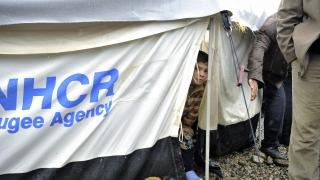
Earlier this week, the United Nations High Commissioner for Refugees (UNHCR) announced that the number of Syrians fleeing their country had surpassed the 2 million mark, with over 97 per cent of these being hosted by neighbouring countries. The numbers are staggering: 722,871 displaced people in Lebanon; 519,676 in Jordan; 463,885 in Turkey; 171,984 in Iraq; and 111,424 in Egypt. The dramatic movement of almost 1.8 million people in 12 months represents a sharp escalation of this humanitarian crisis.
With over half of registered refugees being children, and three quarters of registered refugees living with host families and communities, this influx of people is placing crippling pressure on the infrastructure and economies of the host countries. Thousands seek safety in refugee camps where, although conditions are exceptionally challenging, they are less life-threatening than residing in conflict-torn Syria.
Za'atari camp in Jordan – opened in July 2012 to accommodate 500 people – now has a population of 130,000. There is one outdoor toilet per 50 people, a lack of drinking water and electricity and a constant sanitary hazard presented by flooding. In addition to this, the personal and psychological impact of the conflict is becoming ever more evident. One Syrian refugee, ‘Mohamed’ (interviewed by UNHCR on 31 August 2013) claimed upon registering with his family in Lebanon, “I miss the feeling of home, my family, my childhood friends. All our news from home is about arrests, torture and people dying”.
Unfortunately, there is no immediate sign of this crisis ending. If current trends continue, it is anticipated that approximately 3.5 million Syrians will have left their country by the end of the year with a further 6.8 million internally displaced. Syrian refugees are now dependent on aid, having fled their homes and their country without possessions. The United Nations has appealed for a further $3.3 billion to bolster funding to support people both within Syria and in neighbouring countries to the end of the year. UN humanitarian chief, Baroness Valerie Amos, has pleaded with donor countries to “look again” and be “as generous as they can” with their donations. In response to this, the United Kingdom has pledged a further £52 million worth of extra aid for Syrian refugees. More is required.
The Disasters Emergency Committee (DEC), an umbrella organisation that unites 14 UK humanitarian aid organisations, is currently accepting donations online at www.dec.org.uk






